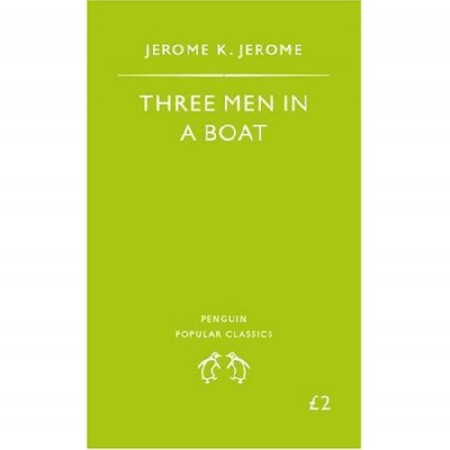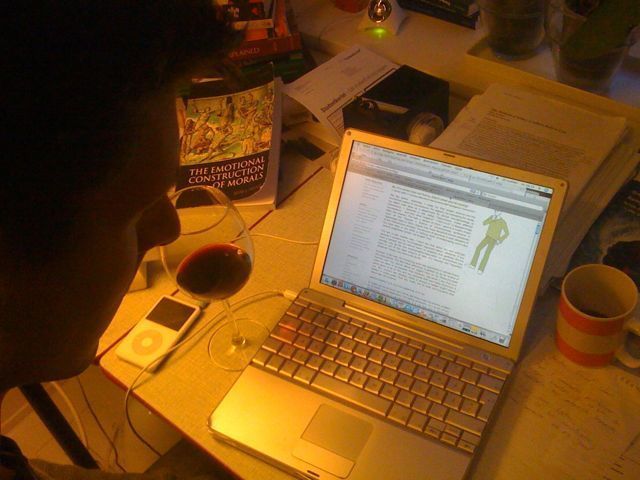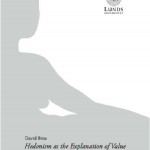Afternoon wine
27 oktober 2009 | In Self-indulgence | 2 CommentsThe notoriously reclusive philosopher D Brax has recently granted a few interviews to a select number of magazines. Being that Pynchonesque creature, I can tell you, means that I’m not that accustomed to dealing with photographers, and their various means of conveying meaning. Thus I found myself quite perplexedly (is that a word? Let’s go ahead and pretend it’s a word) holding a glass of red wine in the middle of the afternoon. You see, this being a wine magazine, holding said receptacle while smiling would somehow get the message across. The perplexedness (word? Let’s say it is) has yet to subside, as you will no doubt see yourself from this picture. Amazingly not a montage.
So, it’s correct but not funny, that’s what you’re saying?
11 oktober 2009 | In Comedy Meta-ethics Neuroscience Self-indulgence | Comments?The day before yesterday, I made my first proper venture into the unchartred waters of neuroscience. For reasons too interesting for words, my debut took place at a department for clinical neurophysiology in Gothenburg. I delivered a talk called ”Value-theory meets affective neuroscience – and then what happens?”. (”Not much” is disappointingly often the answer). This talk, a version of which I gave to a mostly empty room at the Towards a Science of Consciousness conference in Copenhagen back in 2005, argues that these disciplines should colloborate of key motivational concepts. The amount of ignorance in each discipline of the work done in the other is nothing short of embarrasing, and in dire need of rectification (enter: not so petit moi).
The talk is also notable (yes, I think like that about my own writings) because it contains my ”no-Cinderella” argument about reference: If you have a concept but no natural event or property that perfectly fits the concept, you go for the event/property/step-sister on which/whom you have to cut of the least amount of toes. It’s basically the ”imperfect derserver” theory, but more cute, by far.
Anyway: in the talk, I’m intrducing some key arguments in ethical theory and meta-ethics. The fact-value distinction is backed up by an outline of Hume’s Law: You cannot derive an ’ought’ from an ’is’. There are cases when we seem to do precisely this, however. Like when I say that your pants seem to be on fire, and you conclude that your really should put it out. But, Hume’s law dictates, there is always a hidden ’ought’-clause hidden in these cases. That you ought not to wear burning pants after labour-day, for instance.
Hold for laughs 2-3-4. It is not happening, is it? No.
It might not be as funny as I think, but there might be another problem to, to which I cling desperately: I’m talking philosophy to a bunch of non-philosophers, and for a non-philosopher, it is not that easy to distinguish the jokes from the real thing.
Duelling Processes
6 oktober 2009 | In Meta-ethics Moral Psychology | Comments?On Thursday, I’m supposed to summarize and criticize a draft for a paper called ”the Methods of Ethics” (yet contains no reference to Sidgwick) with the subtle subtitle ”conflicts built to last”.
The paper (intersting and very nicely written) reflects on the philosophical importance of the ”dual process” model for moral judgments and points out that having two processes influencing our moral judgments is useful since each process can correct the mistake that the other leads to on its own. In vague and possibly misleading terms, the ”emotional” process is in place to make sure that the ”cognitive” process does not run away with us (getting us stuck in prisoners dilemmas and repugnant conclusions. Also, one presumes, to keep us from making biased calculations), the cognitive process is there to make sure we don’t get stuck in emotionally reinforced prejudices.
One important role for the emotional process is to tilt the actual and perceived utilities of an option so that, for instance, a seemingly rational breach of promise becomes less tempting, due to expected guilt. (It’s a choice-archictural device, to speak with the nudge people.) The two processes are commonly held to be representative of two different moral theories. The cognitive process is broadly ”utilitarian”, and the emotional is broadly ”deontological”, spurring some philosophers to say that the dual process model is a perfect diagnosis of the history of moral philosophy. The relation between the two processes, then, is essentially a conflictual one.
It’s an interesting speculation, but there are complications.
First: there might be several decision procedures at play; the ”dualism” is merely a handy simplification with a long history, reaching us from Plato via Hume, and Jane Austen, for crying out loud.
Second: there is no reason to think that the cognitive process as such is utilitarian – there are other reasoned ways to reach a moral decision.(The empirical work on these issues is just getting started). Nor is there any reason to believe that our emotions are essentially deontological, especially seeing how our emotional systems are among the most complicated, interconnected and plastic in the brain. One can easily imagine an agent whose emotions are always targeting the utilitarian option, who is an intellectually convinced deontologist, for instance.
Third: even if our deliberation can occasionally go against our emotional reactions, what that deliberation is about, what consequences to take into account, has to be established somehow, and emotions certainly play a central role in that process.
I believe it is a mistake to see these processes as being essentially in conflict, rather than in cooperation. We are probably best of when we get the same verdict from both processes (which, admittedly, might require some negotiation) and we usually get into trouble when they don’t.
The paper proposes that the take home lesson from these findings is that we should not be that concerned with reaching the moral truth, but with reasoning correctly, i.e. using both processes. But if we have no moral truth to strive towards, or to use as a corrective tool, how do we know when we have reasoned correctly? Especially seeing how the outcome of each process depends on a number of contingent circumstances. There are infinite possibilities when it comes to what sort of a balance is struck between the two processes, so are they all equally valid?
It’s noteworthy that when considering the Prisoners Dilemma case, the way the author determine that emotional processess help us reach the right decision is by showing that it leads to the best overall consequences. It is good that we have two processes, but that goodness must somehow be assessed, and that calls for one criterion of rightness, not several.
What Simon Said
30 september 2009 | In BBC TV | Comments?I’m a big fan of british comedy panel shows. Have I Got News For You, of course (would they benefit from a new permanent host? If so, my vote is for Kirsty Young or Alexander Armstrong, both being capable of reading the autocue with the right form of detachment), QI, because it got Stephen Fry by the bucket in it, plus the rest of my favorite participiants (I could, and probably will, write at length about the supporting role of Phil Jupitus, the trademark rant of David Mitchell, the off-on-a-tangent brilliance of Bill Bailey etc.), even Mock the Week (Dara O’Briain’s physics jokes, Frank Boyle’s pseudo-psychopathy) and Would I Lie to You (sad to see Angus Dayton leave, but it is a much better vehicle for Rob Brydon), and I haven’t even started listing the radio shows.
And then there is Nevermind the Buzzcocks, returning to BBC tomorrow without the adorable and irreverent Simon Amstell, whose hosting for the past few years can hardly be improved upon. Seriously: when it comes to sheer comedy brilliance, Amstell’s hosting off Buzzcocks is comparable to series 3-5 of the Simpsons. And, even more remarkable for a topical quiz show (about pop-music, no less), it seems to age remarkably well. It’s as much what he says (reads) as how he says it and to whom. Like the question ”When did you first realise that you had what it takes to be Rod Stewarts daughter?” or, to David Gest: ”You’ve must have met Grace Jones? Or married her?” . Or, when Noel Fielding pointed out that Courtney Love could break him (Amstell) ”like a twiglet”: ”Or kill me, and make it look like suicide” (BBC included a disclaimer in that episode.) I’m probably not alone in pleading to the BBC to release the episode with Russell Brand which got cut as part of the official punishment of Brands ill-advised phone calls.
The upcoming series will probably be more or less like when Mark Lamarr left, i.e. a long audition for a new permanent host. It will probably falter for a bit, but I will be there to watch it do so, and so will enough people to keep it running.
Bored by Happiness?
29 september 2009 | In Books Happiness research Hedonism | 1 CommentI write occasionally on this blog called ”the Happiness Blog” (in swedish), which is mostly about psychological, behavioral and political strategies to increase happiness. It’s a fairly honourable pursuit, and the research it is based on is fascinating both in its robust results and in the large areas of it that are still very much up for discussion.
Recently, however, I’ve noticed a lot of reactions to this research that is, well, bored by the whole thing. This is not too surprising, the new wave of books that made it a trend culminated, I’d say, in 2005, and it was bound to get old sooner or later. This autumn will see a surge of books on the subject written in swedish, so we might expect even more of these reactions. The stuff is still highly relevant, of course, eternally so, but there is a bit of a PR problem here. We need to move on from the basics, perhaps even construe some disagreements about different happiness-researchers so that the reaction against a certain view on how happiness should be promoted turns into an argument for an alternative view. (People do this in literary criticism All The Time.)
A big problem, (as I’ve noticed in the mixed reception of my own vain attempts for media attention), is that the criticism vastly underestimate the complexity of the happiness researchers claims. While I’m actually quite pleased that books with some scientific credentials is budding in on the self-help market, it also opens up for poorly researched self-help books to dress up as science. While happiness-reserachers, often believe that even poorly reasoned self-help books might do more benefit than harm, its important to keep a certain distance. At least if we want the coverage, and the discussion, to become more nuanced and the full complexity of the research be allowed to surface.
Who likes short shorts?
26 september 2009 | In Hedonism Meta-ethics Naturalism Self-indulgence Uncategorized | 2 CommentsLately, the question ”what is your dissertation about” has become somewhat more frequently asked of me. Forthy-five minutes later, I usually get the impertinent question if I’d mind making the answer a bit shorter. Well, I do mind, but allright. So I end up experimenting with different short-versions, none of which is unqualifiedly true. But then again, to be unqualifiedly true is pretty much to ask of any theory. After all, my argument is that hedonism is true enough. Anyway: I’d thought I’d give it another go, and to give you in less than, say 200 words, the gist of my theory of value. Ready? Here we go:
What’s good? Opinions diverge, so we turn to the more basic question: What do we say when we say that something’s good? What would make that statement true? Theories are wildly at odds with each other. What to do? It seems we are dealing with different uses of the term ’good’, and we must decide how to treat this problem. The first decision is to look for their common origin, so we can say that these uses are variations on a common theme. The other decision is to treat goodness as a natural property.
Whatever value is, it must correspond to what we believe about it. We might be mistaken about it, but cannot be totally wrong. Value should fit with our beliefs about value and be part of the causal explanation of those beliefs. I argue that pleasure fits with many of our value beliefs, especially regarding how value relates to motivation, and it is universally believed to be valuable. Hedonic processes, are also a key part of the causal explanation of our evaluations, and evaluating abilities. This means that the common beliefs that the theory does not make true, it can explain away. Pleasure is value.
How did I do?
Philosophical strategy
22 september 2009 | In Meta-philosophy | 2 CommentsWhen philosophical questions are being asked, my go-to answer is usually ” ’Yes’, with an ’if’, or ’No’ with a ’but’ .”
Do we have free will? Well, yes, if you’re prepared to accept being within a certain range of mental parameters as having free will. No, if you are looking for something somehow else. Then there is no free will, but there is a pretty good substitute, one that quite closely fits with what we expect from free will, and makes it possible to distinguish between free and unfree acts in a way corresponding to our intentions in using that term. And so on for God, virtues, consciousness, value, causation, etc.
As the discerning reader will no doubt have noticed by now, the ”yes” and ”no” answers can be roughly the same: the qualifications push them into roughly the same position. Which is why one should never rely to much on the fact that one philosopher says ”yes” and the other ”no” to a particular question. Nor, of course, should one rely on the fact (if it ever is one) that two philosophers seem to agree. But mostly, one should take to heart the words of Robert Webb, playing that part of a raging host of the radio show ”Big Talk”:
Guest (being asked whether there is a God): Well, there is no yes or no answer.
Webb: What? I can think of two yes or no answers right of the top of my head!
Confession
21 september 2009 | In Books | Comments?In one of David Lodge’s campus novels (”as opposed to what?” I hear you say. ”His social-realistic stories set in the rural south? They’re all campus novels”. Fair point) we come across the parlour game ”Humiliation” . Each participiant writes down the name of a book he or she hasn’t read. The winner, in a purely technical sense, is the participant whose choosen book has been read by the largest number of participiants (Hint: writing down ”the Da Vinci Code” doesn’t work half as often as you might think. It neither wins you the game, nor endears you to your friends). The name of the game, I take it, is fairly self-explanatory. In the novel (”Nice work”, it might have been. Or ”Small world”), a professor of english literature, desperate to win, owns up to not having read ”Hamlet” and is subsequently fired from his position.
Anyway, I’m just about to loose my winning entry for this game. I’m finally reading ”Three men in a boat”. The fact that I haven’t read it already is not so much humiliating, perhaps, as inexplicable. Not only is it the hands down, drop dead funniest book I’ve ever read, it is also, arguably, the source of everything that have been funny every since. Literary slap-stick at its best, and a grand festival of non-sequiturs. It is also an excellent display of that celebrated, scorned and recently hotly debated comic device: the cutaway joke. Done well, as it is in ”three men”, it doesn’t bring the story to a screetching halt, or it does, but you don’t mind. The point is that what’s beside the point (or beside the plot, anyway), just is the point.

Post Doc Posts Document
15 september 2009 | In blogg-launch Hedonism Self-indulgence | 2 CommentsSay you’re interested in the nature of pleasure. Say you’ve harbored hedonistic inclinations all of your life, but haven’t really found a version of that theory that really fits with your empiricist life-style. Say that you find meta-ethics absolutely hilarious and the publishing industry just can’t turn out books on the subject fast enough for you. Quite besides the obvious fact that you and I should be friends, (Facebook friends at least – all the information, none of the guilt for not calling, or caring, really), here is something you might be interested in.
It’s my dissertation, ”Hedonism as the Explanation of Value”, which I (successfully, I might add) defended in Lund, Sweden on Saturday the 12th of september.
Lady who Launches
15 september 2009 | In blogg-launch | 1 Comment”What are you doing, Dave? This is highly irregular”. Right you are, Hal, but that’s ”Dr Brax” to you. The irregularity referred to is this: my posting a blog, and having every intention to make a habit of writing on it. About philosophy, mainly, and about the parts of the empirical sciences that are relevant to philosophy, especially the moral and evaluative parts of it.
But I’m sure I will write about books and music and TV here as well. I believe we’re about to have fun, ladies and gentlemen, I really do.

